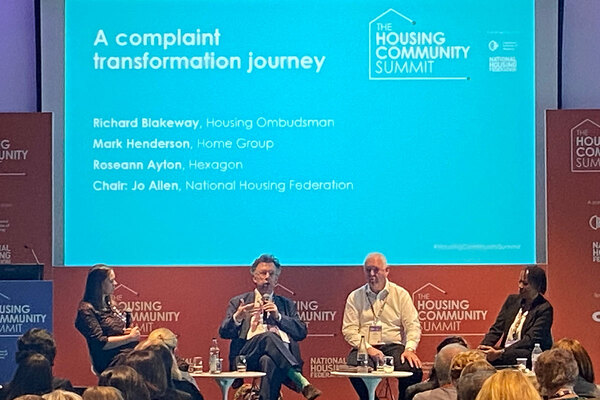You are viewing 1 of your 1 free articles
Ombudsman highlights eight landlords and ‘human cost’ of temporary moves in latest report
In its latest severe maladministration report, the Housing Ombudsman has challenged the approach of eight landlords to moving residents temporarily.
The watchdog’s latest report shared learning from cases where residents were moved temporarily while works were carried out on a property, the processes of which led to distress and anxiety.
The landlords named are Kensington and Chelsea Council, Lambeth Council, Moat Homes, Notting Hill Genesis, Orbit Group, Peabody, Southwark Council and Wandle.
It revealed a case involving a pregnant resident who was moved several times before not being able to return home due to the birth of her baby, and another in which a resident was housed in temporary accommodation for three years.
It also challenged the use of the term “decant”, which Richard Blakeway, the housing ombudsman, described as “crude, dehumanising and stigmatising language for what can be a difficult and emotional process for any person”.
Other cases included a resident’s request to be moved because of poor living conditions not being actioned until a ceiling collapsed, and residents being locked out of hotel rooms because the landlord had not paid the invoices.
“Throughout this report, the human cost of temporary moves is laid bare. There are cases where residents have spent months or years in temporary accommodation, sometimes bumped between different hotels, with experiences of financial hardship and difficulties coping with medical conditions,” Mr Blakeway said.
“In some instances, children are not appropriately safeguarded.
“You can see in every case the different ways the resident was simply not heard. It is a sombre read,” he added.
The report forms part of a series intended to help landlords prepare for the introduction of Awaab’s Law, which has specific requirements for landlords around temporary moves where there are risks to the health and safety of residents.
“Providing temporary housing is something almost every landlord will need to do at some stage. Every week there will be successful temporary moves. Given the costs that can be involved in this process, it is important to get it right,” Mr Blakeway said.
The ombudsman flagged a number of learning points for landlords, including improving communication to reduce stress and anxiety for residents and the consequences of not providing temporary accommodation at the right time.
“The landlord is putting the resident, as well as their own organisation, at risk by delaying a temporary move when the conditions are hazardous. This cannot be justified,” the report said.
This was highlighted in a case where a Peabody resident was left in a dangerous property that included an exposed live wire for 31 days before being offered a temporary home.
Peabody said in a learning statement that its service had fallen “well short of the standards these residents rightly expected from us, and well below the standards we expect of ourselves. We are very sorry.
“We have acted on the orders of the ombudsman, and we are working with residents to put things right in all of these cases.”
Notting Hill Genesis (NHG) said it recognised "the myriad ways in which we let our resident down and fully accept the findings of the ombudsman’s report".
"More broadly, we recognise that in recent years our service has not consistently been at the level we need it to be. In March 2023, we published a new policy outlining our approach to dealing with damp and mould in our homes, which includes action to proactively identify and quickly remedy any presence of damp and mould," NHG said.
A Kensington and Chelsea spokesperson said: “We apologise to the resident for their inconvenience and have complied with each of the ombudsman’s orders.
“We always try to account for our residents’ unique individual circumstances when assisting them with their housing, and we are grateful to the ombudsman for providing clarity over the definition of what constitutes a vulnerability. We will be applying this learning to all future cases.”
A Moat spokesperson said: “We care about ensuring our customers feel comfortable and happy in their homes, and we are truly sorry for failing our customer and their family.
“We’ve taken this situation to heart and used the experience to train our housing management and complaint handling teams.”
A spokesperson for Orbit said: “We are extremely sorry for letting our customer down and creating unnecessary stress and inconvenience at a time when they needed support from their landlord.
“We have taken important learnings from this case to improve the effectiveness of our service and communications with customers, and our support for those with additional needs.”
A Southwark spokesperson said: “We sincerely regret the inconvenience caused by the delay in addressing the repair at this property. We acknowledge that the situation could have been managed more efficiently.
“We accept the Housing Ombudsman’s findings in full and we have made a formal apology to the resident and agreed to the compensation.”
A spokesperson for Wandle said: “We’re deeply sorry that our service to this resident didn’t meet the standard we strive to deliver. We apologised unreservedly to the tenant affected and fully complied with the orders made.”
The report also referred to the recent Grenfell Tower Inquiry report, which stressed how the Kensington and Chelsea Tenant Management Organisation failed to take resident complaints seriously.
Sign up for our care and support newsletter
Already have an account? Click here to manage your newsletters












